‘Help me be brave’: COVID-19’s impact on a fishing community in Indonesia
Self, COVID-19 , StoriesContributed by: Compassion Canada
A stunning new video from Indonesia follows Keilah, the daughter of a fisherman in Indonesia. Click here to watch the video.
In a small fishing community in Indonesia, 11-year-old Keilah sits cross-legged on her bed, her face silhouetted by the soft glow of a torch. Her hands are clasped tightly together under her chin, eyes closed. Her mouth moves silently. As the pandemic wears on, her prayers have become increasingly urgent.
“Please help this to end soon,” she whispers. “I can tell that Papa is worried.”
Two hundred metres away, the wind brushes gently across Juandris’ face as he walks across the sand towards a small wooden boat. At exactly 7 p.m. each evening, this father of two leaves his house, walking the short distance to the shore. He leaves his family, including his daughter Keilah, at a time when his neighbours are typically preparing to rest. Instead, he climbs into his boat and sails far offshore and long into the night, in search of fish.
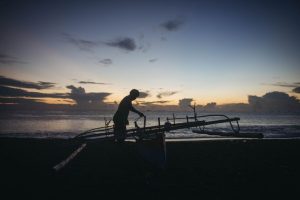
Juandris knows no other way to provide for his family. He lost his job on a large commercial fishing boat due to COVID-19 restrictions. Now, he takes his own small boat out every night to try and feed his family. It’s hard, unpredictable work.
“Every day when I sail the sea, I can’t predict how many fish I will get. It depends on the weather and if there is fish, and if they bite my bait,” Juandris says with a small smile.
When he arrives back on the shore in the morning, Keilah is waiting to meet him. “Every morning, I wait for my father at the beach when he comes home from the sea. I help him to carry the fish home,” she says.
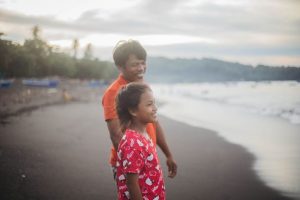
She does her best to put a smile on her father’s face. “I enjoy making jokes with my dad because I know he will laugh. I also often make coffee for him and help clean the boat together.”
A difficult year of heartbreak and devastation
After losing his job on the fishing boat in March 2020, Juandris was willing to try anything. He joined another commercial boat who fished in the waters of Papua. The opportunity seemed promising—the new fishing boat hired more men than his previous job.
However, the job ended in heartbreak. Juandris was separated from his family for six months. For three of these months, he lived adrift in a city in Papua without a rupiah to his name. The ship’s owner had cheated him and didn’t pay him as promised. He returned home with nothing to show for his sacrifice.
Juandris is not the only caregiver struggling to find a job during the pandemic. Ninety percent of the caregivers whose children are part of the Compassion child development centre in Batu Putih, Sulawesi have lost their main source of income as fisherman, unskilled laborers or daily workers.
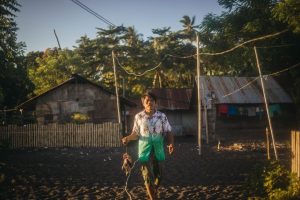
“Before the pandemic, I had a small amount of savings that I collected every month from the salary I earned. I had a plan to build a boat, so I wouldn’t need to borrow a boat from my neighbor every time I want to go fishing. But my savings were used up to buy food for my family when I could no longer work,” Juandris shares.
The UN Development Programme reports that children are at risk of becoming the biggest victims of the devastating social and economic impacts of COVID-19. The fallout affects every area of their life, from their health to their schooling.
“Sometimes I feel worried if my father is getting sick,” said Keilah. “I pray to God to protect my father because I love him.”
Since the pandemic started, Juandris has turned his hand to everything he can think of to put food on the table for his family. “Before the pandemic, every night I would think about the job I will do the next day,” he says. “But now, it’s harder to think of what I will do for tomorrow. As a husband and father, I feel like I’m not functioning and playing my part well, especially when I’m not sure if I can earn enough money to buy food for my family.”
Before the pandemic, Juandris would give Keilah 14 cents as pocket money to spend at school every day. “Nowadays, I don’t give the pocket money to my daughter anymore. It’s not because she is learning from home. It’s because I have no money to give to her,” he says.
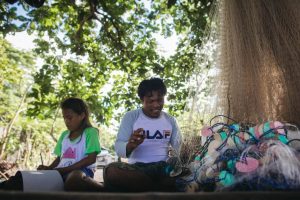
Studying from home is challenging for Keilah. The family doesn’t have a smartphone. Without this device and the internet connection it provides, online learning is impossible. “I miss going to school like before, studying together in a class,” Keilah says. She loves having her father home in the afternoon with her. He tries to join her as she completes her schoolwork, but since Juandris was unable to complete his own schooling, he sometimes struggles to understand his daughter’s work.
The support of the Compassion centre
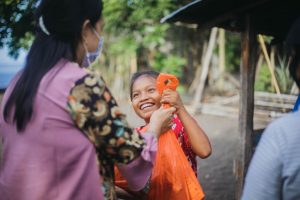
Despite all the challenges faced by Juandris, Keilah and their family, the Compassion centre where Keilah is part of Compassion’s child sponsorship program has provided support to meet their needs.
“Every week, our tutors arrange visits to each child’s home to meet with the kids and parents. We check on their family’s condition and listen as they share their situation,” says Feiby, the Compassion centre director.
The tutors carry out the teaching and learning process during home visits. The material provided is the same as before the pandemic, only with a different method and approach. “Though I miss going to school like I used to, I also enjoy studying from home, especially since my father is always at home. He doesn’t have to leave the house and come back every two days,” says Keilah.
In March 2021, a year after restrictions first closed schools across Indonesia, Keilah’s school allowed students to visit once per week to pick up and submit the assignments from their teachers. This helps to accommodate children like Keilah, who don’t own a smartphone.
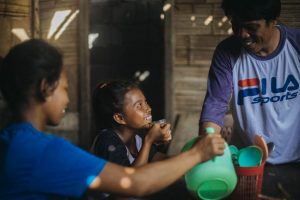
The Compassion centre’s support also includes groceries for each family. “Even in normal times, sometimes we ate only rice without side dishes. During the current pandemic, our situation is much more difficult,” says Juandris. “I can’t imagine our life without support from Compassion.”
The support from Compassion inspires Juandris to keep working to meet his family’s needs. Even though his catch is not always what he wants it to be, he hopes to sell it. “If Compassion cares about our situation, then I have to stay passionate about my work, no matter how difficult it is,” he said.
Being brave: ‘I try to enjoy what I have now’
Over the summer, Indonesia experienced one of the world’s worst waves of the COVID-19 Delta variant. It was a sobering reminder that this crisis is ongoing—and the world’s most vulnerable are always the hardest hit.
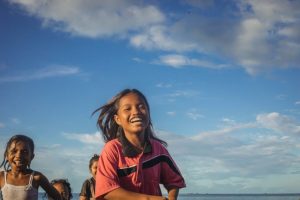
And yet in the midst of these difficult and unthinkable circumstances, families like Keilah’s continue to choose to be brave. Juandris spends his precious moments from the afternoon to the evening with his daughters, trying to help them to study and playing with them at home. Life isn’t easy, but he has faith they will make it.
“All that I can do is be grateful for the life and family I have, plus the support from the Compassion centre,” he said. “I have learned to be grateful, be patient and not overthink about the work I no longer have. I try to enjoy what I have now. I’m grateful because every day, I can still be with my wife and my children. I think I can still survive today because my family still supports and understands my situation.”
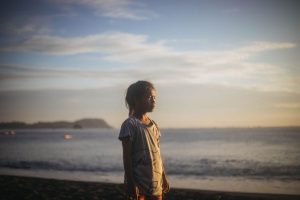
Back in her room, Keilah prepares for sleep while her father pushes his boat through the warm water, the waves slapping at his thighs. His long night is just beginning, but his daughter is covering him in prayer. “I can tell Papa is worried. But I won’t be scared,” she whispers. “Help me to be brave. For him. Amen.”
____
Child sponsorship ensures children and families in poverty are supported through difficult times.

